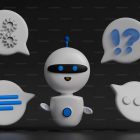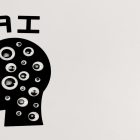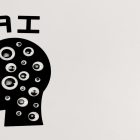The Impact of Artificial Intelligence on Job Markets: Are We Ready?

Impact of Artificial Intelligence – Artificial Intelligence (AI) has been the talk of the town for a while now. With the rise of AI, there has been a lot of debate about its impact on job markets. Many experts believe that AI will disrupt the job market as we know it, leading to the displacement of millions of workers across various industries. The question that arises is, are we ready for this disruption? In this article, we will explore the impact of AI on job markets and try to answer this question.
Introduction: AI’s Disruptive Potential
Impact of Artificial Intelligence – Artificial Intelligence has been around for quite some time now. However, with the advancements in technology and the availability of vast amounts of data, AI has become more sophisticated than ever before. AI is now being used in various industries, including healthcare, finance, and transportation, to name a few. The potential benefits of AI are enormous, but there is also a downside to this technology. The downside is the impact AI may have on job markets. With the ability to automate tasks and perform them faster and more accurately than humans, AI may lead to the displacement of millions of workers.
The Impact of Artificial Intelligence on Job Markets: Are We Ready?
The impact of AI on job markets is a topic of hot debate. While some experts believe that AI will create new jobs and improve productivity, others believe that AI will lead to massive job losses. According to a report by the World Economic Forum, AI and automation are expected to displace around 75 million jobs globally by 2022. The report also suggests that the displacement of jobs will be offset by the creation of 133 million new jobs. However, the new jobs may require different skill sets, and workers may need to reskill or upskill themselves to stay relevant in the job market.
How AI is Disrupting Job Markets
AI is disrupting job markets in several ways. One of the ways AI is disrupting job markets is through automation. AI can automate repetitive and mundane tasks, freeing up human workers to focus on more complex tasks. However, this may lead to the displacement of workers whose jobs are repetitive and can be automated. Another way AI is disrupting job markets is through the creation of new job roles. As AI technology advances, new job roles such as AI trainers, data scientists, and AI ethicists are emerging. These job roles require specialized skills, and workers will need to upskill or reskill themselves to fill these positions.
Industries Most Affected by AI
AI is expected to have a significant impact on various industries. Some of the industries that are most affected by AI include:
Healthcare
AI is expected to revolutionize the healthcare industry. AI can analyze vast amounts of medical data and assist healthcare professionals in diagnosis, treatment, and drug development. However, the use of AI in healthcare may lead to the displacement of some healthcare workers, such as medical coders and transcriptionists.
Manufacturing
AI is already being used in the manufacturing industry to automate tasks such as quality control and predictive maintenance. This may lead to the displacement of some workers in the manufacturing industry.
Transportation
AI is expected to disrupt the transportation industry in several ways. Self-driving cars and trucks are expected to become a reality soon, which may lead to the displacement of millions of drivers and delivery personnel.
Finance
AI is already being used in the finance industry to automate tasks such as fraud detection and risk assessment. This may lead to the displacement of some workers in the finance industry, such as fraud analysts and underwriters.
What Can We Do to Prepare for the Impact of AI on Job Markets?
The impact of AI on job markets is inevitable. However, there are things we can do to prepare for this impact. One of the things we can do is to upskill and reskill ourselves. As AI creates new job roles, workers will need to acquire new skills to fill these positions. Employers can also invest in training and development programs to help their workers upskill and reskill themselves.
Another thing we can do is to encourage education and training in STEM fields. STEM skills are in high demand in the AI industry, and workers with STEM skills are likely to be in high demand in the job market. Governments can also encourage education and training in STEM fields by investing in STEM education and providing scholarships and grants to students pursuing STEM degrees.
We can also invest in social safety nets to support workers who are displaced by AI. Governments can provide unemployment benefits, retraining programs, and other forms of assistance to help displaced workers transition into new jobs.
FAQs
Will AI lead to massive job losses?
It is possible that AI may lead to massive job losses, especially in industries that rely on repetitive and mundane tasks. However, AI may also create new job roles and improve productivity, leading to the creation of new jobs.
What industries are most affected by AI?
Industries such as healthcare, manufacturing, transportation, and finance are most affected by AI.
Will workers need to upskill and reskill themselves to stay relevant in the job market?
Yes, workers will need to upskill and reskill themselves to stay relevant in the job market as AI creates new job roles that require specialized skills.
What can employers do to prepare for the impact of AI on job markets?
Employers can invest in training and development programs to help their workers upskill and reskill themselves. They can also embrace new technologies and encourage innovation in their organizations.
What can governments do to prepare for the impact of AI on job markets?
Governments can invest in STEM education, provide social safety nets to support displaced workers and encourage innovation and entrepreneurship in their countries.
Can AI improve productivity in the workplace?
Yes, AI can improve productivity in the workplace by automating tasks and freeing up human workers to focus on more complex tasks.
Conclusion
The impact of Artificial Intelligence on job markets is a topic of hot debate. While AI has the potential to create new jobs and improve productivity, it may also lead to the displacement of workers in various industries. To prepare for this impact, workers will need to upskill and reskill themselves, and employers and governments will need to invest in training and development programs, STEM education, and social safety nets. While the future of work may be uncertain, we can take steps to prepare ourselves for the changes that are to come.






















